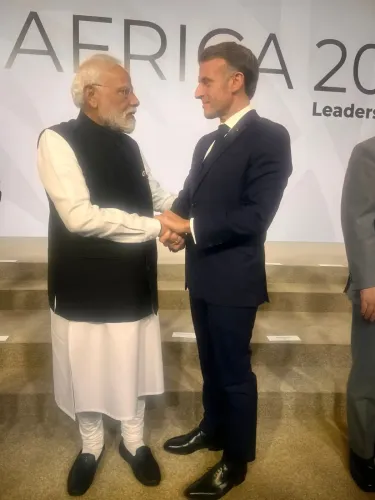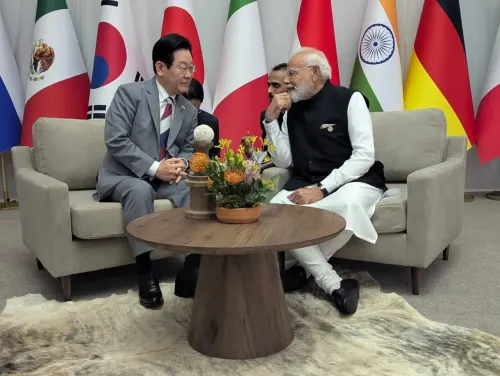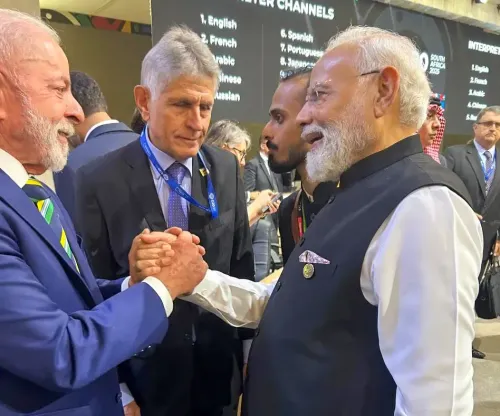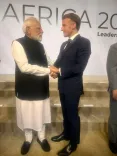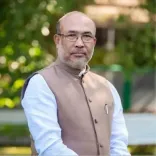Is India Now a More Promising Ally for BNP and Tarique Rahman than Troubled Pakistan?
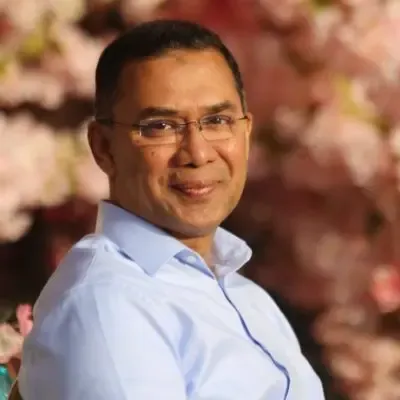
Synopsis
Key Takeaways
- Tarique Rahman's return marks a crucial phase for the BNP.
- The BNP's distancing from Jamaat-e-Islami is a positive development for India.
- India aims to restore relations with Bangladesh amid evolving political dynamics.
- Citizens are demanding strong leadership and economic stability.
- Collaboration with a reliable partner like India is vital for Bangladesh's future.
New Delhi, Oct 7 (NationPress) The enduring 26-year self-exile of BNP’s acting chairman Tarique Rahman is approaching its conclusion as he has declared his imminent return to Bangladesh. Rahman, who is considered a potential Prime Minister if BNP secures victory in the elections, has resided in self-exile in London for nearly three decades.
The 58-year-old Rahman, son of former Prime Minister Khaleda Zia, has also confirmed his candidacy for the upcoming elections. His announcement is a clear indication that elections in Bangladesh are on the horizon.
The caretaker of the interim government, Muhammad Yunus, has stated that elections will occur by February of next year. India is carefully monitoring these developments. With the Awami League barred from participating, all opinion polls suggest a favorable outcome for the BNP.
During the BNP's tenure from 2001 to 2006, relations with India were tense due to border security concerns and accusations of supporting anti-India terrorist factions. India had voiced worries in 2004 following the seizure of ten truckloads of weapons at Chattogram’s CUFL jetty.
India asserted these weapons were intended for separatist groups in the northeast. Indian officials indicate that ties have deteriorated post-Hasina's ouster, but Prime Minister Modi has emphasized the importance of maintaining engagement with Dhaka and normalizing relations, according to official sources.
Various diplomatic efforts have been made to ensure a restoration of ties. PM Modi and Yunus even engaged on the sidelines of the BIMSTEC Summit in Bangkok, Thailand, earlier this year. Given the current administration's strong ties with Jamaat-e-Islami, improving relations has proven challenging. The Jamaat's connections to the ISI have hindered diplomatic progress.
With the Awami League sidelined, New Delhi is contemplating a scenario where the BNP ascends to power with Rahman as Prime Minister. Although India has faced challenges with the BNP and Rahman in the past, recent months have shown some alignment.
While backdoor discussions have occurred, a complete re-engagement may follow the 2026 elections. India had previously expressed concerns regarding Rahman’s connections to fundamentalist groups and the ISI, as he was thought to maintain close ties with extremist factions.
New Delhi hopes for a shift in Rahman’s approach. Now politically seasoned, he might prioritize rebuilding relations with India for the benefit of his nation, being cautious of excessive Pakistani influence and learning from the situations in Pakistan-occupied Kashmir and Balochistan.
Importantly, he must consider the desires of the populace, who are weary of the ongoing uncertainty and violence in the country. Given the present circumstances in Bangladesh, engaging with the BNP seems to be the most pragmatic choice for India.
India is particularly encouraged by the BNP's decision to distance itself from the Jamaat, which is viewed as an extremist organization. Following Hasina's ousting, BNP leaders and Indian officials have convened at multiple levels, including a significant meeting last September between BNP General Secretary Fakhrul Islam Alamgir and Indian High Commissioner Pranay Varma.
Fakhrul has assured that the BNP will prevent Bangladeshi territory from being utilized against India's security interests. India's commitment to fostering positive relations with Bangladesh was evident when PM Modi conveyed his best wishes to Yunus upon his appointment as chief advisor.
Despite India's best efforts, radical factions have attempted to undermine relations, chiefly from the Jamaat, which has made inflammatory statements against India while providing more ground for Pakistan's influence.
While there were concerns among BNP members regarding India's relations with Bangladesh during Hasina's administration, there is now a recognition that India remains a more dependable partner. The party leadership is aware of the significant uprising that led to Hasina's removal and would prefer to avoid a similar scenario.
Citizens are demanding decisive leadership and a robust economy. For this to materialize, the BNP acknowledges that aligning with a strong economic and military power is far more advantageous than relying on a faltering Pakistan.

